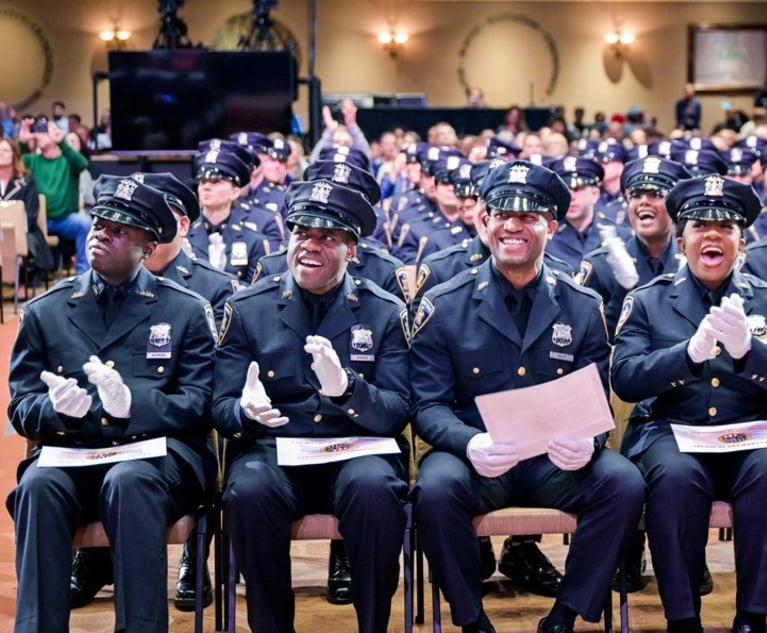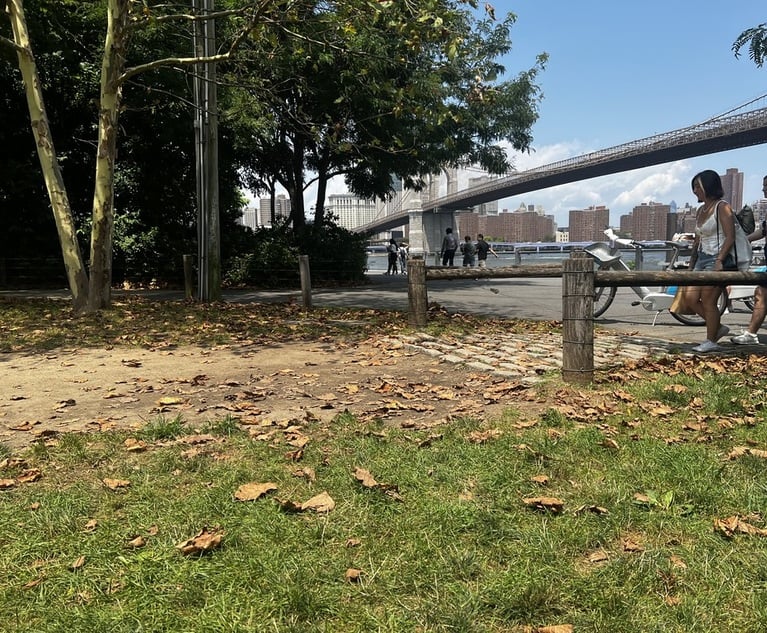 Janine Pollack, left, and Regina Calcaterra, right, partners with Calcaterra Pollack. Courtesy photos
Janine Pollack, left, and Regina Calcaterra, right, partners with Calcaterra Pollack. Courtesy photosAmid the Pandemic, 2 Women Pursue Their Own Plaintiffs Firm
Attorneys Regina Calcaterra and Janine Pollack, former colleagues at Wolf Haldenstein, have launched Calcaterra Pollack with plans to focus on complex litigation, including class actions brought over COVID-19 issues.
June 08, 2020 at 04:18 PM
5 minute read
As some firms plan layoffs and furloughs amid COVID-19, Regina Calcaterra and Janine Pollack quietly launched their own New York plaintiffs firm last month. Calcaterra, formerly at Wolf Haldenstein Adler Freeman & Herz, and Pollack, who left the same firm in 2018, recruited five of their colleagues to Calcaterra Pollack—partner Michael Liskow, an associate and three staff members—as well as a senior associate from Kelley Drye & Warren.
The new firm plans to pursue class actions on behalf of shareholders and consumers alleging fraud, including during the pandemic. Both lawyers said they predicted the plaintiffs' bar could bring cases asserting constitutional rights violations relating to the recent protests.
I spoke with Calcaterra and Pollack about their women-owned firm and diversity in the plaintiffs bar.
This Q&A has been edited for length and clarity.
What made you go off on your own?
Calcaterra: I worked at Wolf Haldenstein from May 2016 going forward, and before that, in government. While I was at the firm, I was trying to change the diversity of the firm. More recently, in and around February, I started thinking about opening up my own firm.
Ultimately, I started putting together the concept of the firm in March, and did a soft launch of the firm in April.
Did you hesitate at all to launch the firm in the midst of the COVID-19 pandemic?
Calcaterra: We were able to continue with our plans to launch this firm in the middle of a crisis when most firms were laying off, furloughing or decreasing salaries. Everyone is looking for something nice and good to happen in a pandemic. We saw our firm as a birth. We thought it was a very positive thing to do. Everyone has been so excited about it—that it was a women-owned, women-led firm with incredible diversity. And we had the energy and the ability to put this together in a very short time but put it together the right way and have all the good positive energy that goes with that.
Many women appointed to leadership positions in class actions and multidistrict litigation have started their own firms, rather than move up the ladder within plaintiffs' firms. Why?
Pollack: Over the years, in the plaintiffs bar, the men really have been at the forefront. But there is a lot of women who are incredible litigators, and they just haven't been able to break through that barrier, and the men are realizing that the judges want the women to play important roles as leaders. That was the thing that catapulted women into the fore. The women are incredibly qualified, and judges want to make sure they have the opportunity, and the plaintiffs bar has not been that good at that for many years. What you've got is a metamorphosis, and the judges and juries want to see women and minorities in charge.
Calcaterra: You need the right clients to do it. A lot of clients in antitrust MDLs, commercial MDLs, are public entities. They're governments, state and local entities out there, that are more apt to hire MWBE [minority/women-owned business enterprise] and minority law firms, and so, by the time we're seeking positions in MDLs, we've got the client behind us as well.
What type of cases do you plan to bring, particularly related to COVID-19 issues?
Pollack: We have a broad array of cases. We have class actions we're continuing to pursue that are consumer deception, false advertising, product liability. Also, we have class action antitrust matters. Also, wrongful death individual actions, and securities class actions.
One of the things we're expecting to happen here is that the current climate is going to cause two things to happen: one from the perspective of the consumer, and one from corporate America. One causes the other. This kind of climate does tend to lend itself to some increase in bad corporate behavior, and when that happens, you often get an increase of consumer awareness of what's happening. Our job is to respond to that, investigate every complaint, to see if laws are broken. We expect a surge not only because of corporate America, but also people are working from home, have more time on their hands, and are in a bad place and worried about things.
Calcaterra: Also, we have a social justice practice, which, right now, includes representing adults who were sexually assaulted as children. We're expecting [the plaintiffs' bar] to be representing people who were subjected to constitutional rights violations in the midst of all the protests going on. We're suited to do that because of our experience.
Do you think there will be many lawsuits relating to the protests?
Calcaterra: We expect social justice cases to be on the rise across the U.S. One, more along the idea of class actions, would be a large group of people prevented from protesting peacefully, because that's their right under the First Amendment. And the other would be individual cases of those who are detained in violation of their constitutional rights.
This content has been archived. It is available through our partners, LexisNexis® and Bloomberg Law.
To view this content, please continue to their sites.
Not a Lexis Subscriber?
Subscribe Now
Not a Bloomberg Law Subscriber?
Subscribe Now
NOT FOR REPRINT
© 2024 ALM Global, LLC, All Rights Reserved. Request academic re-use from www.copyright.com. All other uses, submit a request to [email protected]. For more information visit Asset & Logo Licensing.
You Might Like
View All
Latest Class of Court Officers Sworn Into Service in New York

Decision of the Day: Judge Reduces $287M Jury Verdict Against Harley-Davidson in Wrongful Death Suit

Decision of the Day: Judge Denies Summary Judgment Motions in Suit by Runner Injured in Brooklyn Bridge Park

Decision of the Day: Administrative Court Finds Prevailing Wage Law Applies to Workers Who Cleaned NYC Subways During Pandemic
Law Firms Mentioned
Trending Stories
- 1How I Made Law Firm Leadership: 'It’s Imperative That You Never Stop Learning,' Says Ian Ribald of Ballard Spahr
- 2People in the News—Dec. 30, 2024—Pond Lehocky, Buchanan Ingersoll
- 3Orange Belongs to All: U-Haul Suit Argues Rival Public Storage Cannot Claim the Color
- 4Continuing Consolidation: The Biggest Legal Tech M&As of 2024
- 5FTC Announces HSR Final Rulemaking Impacting Premerger Filings
Who Got The Work
Michael G. Bongiorno, Andrew Scott Dulberg and Elizabeth E. Driscoll from Wilmer Cutler Pickering Hale and Dorr have stepped in to represent Symbotic Inc., an A.I.-enabled technology platform that focuses on increasing supply chain efficiency, and other defendants in a pending shareholder derivative lawsuit. The case, filed Oct. 2 in Massachusetts District Court by the Brown Law Firm on behalf of Stephen Austen, accuses certain officers and directors of misleading investors in regard to Symbotic's potential for margin growth by failing to disclose that the company was not equipped to timely deploy its systems or manage expenses through project delays. The case, assigned to U.S. District Judge Nathaniel M. Gorton, is 1:24-cv-12522, Austen v. Cohen et al.
Who Got The Work
Edmund Polubinski and Marie Killmond of Davis Polk & Wardwell have entered appearances for data platform software development company MongoDB and other defendants in a pending shareholder derivative lawsuit. The action, filed Oct. 7 in New York Southern District Court by the Brown Law Firm, accuses the company's directors and/or officers of falsely expressing confidence in the company’s restructuring of its sales incentive plan and downplaying the severity of decreases in its upfront commitments. The case is 1:24-cv-07594, Roy v. Ittycheria et al.
Who Got The Work
Amy O. Bruchs and Kurt F. Ellison of Michael Best & Friedrich have entered appearances for Epic Systems Corp. in a pending employment discrimination lawsuit. The suit was filed Sept. 7 in Wisconsin Western District Court by Levine Eisberner LLC and Siri & Glimstad on behalf of a project manager who claims that he was wrongfully terminated after applying for a religious exemption to the defendant's COVID-19 vaccine mandate. The case, assigned to U.S. Magistrate Judge Anita Marie Boor, is 3:24-cv-00630, Secker, Nathan v. Epic Systems Corporation.
Who Got The Work
David X. Sullivan, Thomas J. Finn and Gregory A. Hall from McCarter & English have entered appearances for Sunrun Installation Services in a pending civil rights lawsuit. The complaint was filed Sept. 4 in Connecticut District Court by attorney Robert M. Berke on behalf of former employee George Edward Steins, who was arrested and charged with employing an unregistered home improvement salesperson. The complaint alleges that had Sunrun informed the Connecticut Department of Consumer Protection that the plaintiff's employment had ended in 2017 and that he no longer held Sunrun's home improvement contractor license, he would not have been hit with charges, which were dismissed in May 2024. The case, assigned to U.S. District Judge Jeffrey A. Meyer, is 3:24-cv-01423, Steins v. Sunrun, Inc. et al.
Who Got The Work
Greenberg Traurig shareholder Joshua L. Raskin has entered an appearance for boohoo.com UK Ltd. in a pending patent infringement lawsuit. The suit, filed Sept. 3 in Texas Eastern District Court by Rozier Hardt McDonough on behalf of Alto Dynamics, asserts five patents related to an online shopping platform. The case, assigned to U.S. District Judge Rodney Gilstrap, is 2:24-cv-00719, Alto Dynamics, LLC v. boohoo.com UK Limited.
Featured Firms
Law Offices of Gary Martin Hays & Associates, P.C.
(470) 294-1674
Law Offices of Mark E. Salomone
(857) 444-6468
Smith & Hassler
(713) 739-1250






